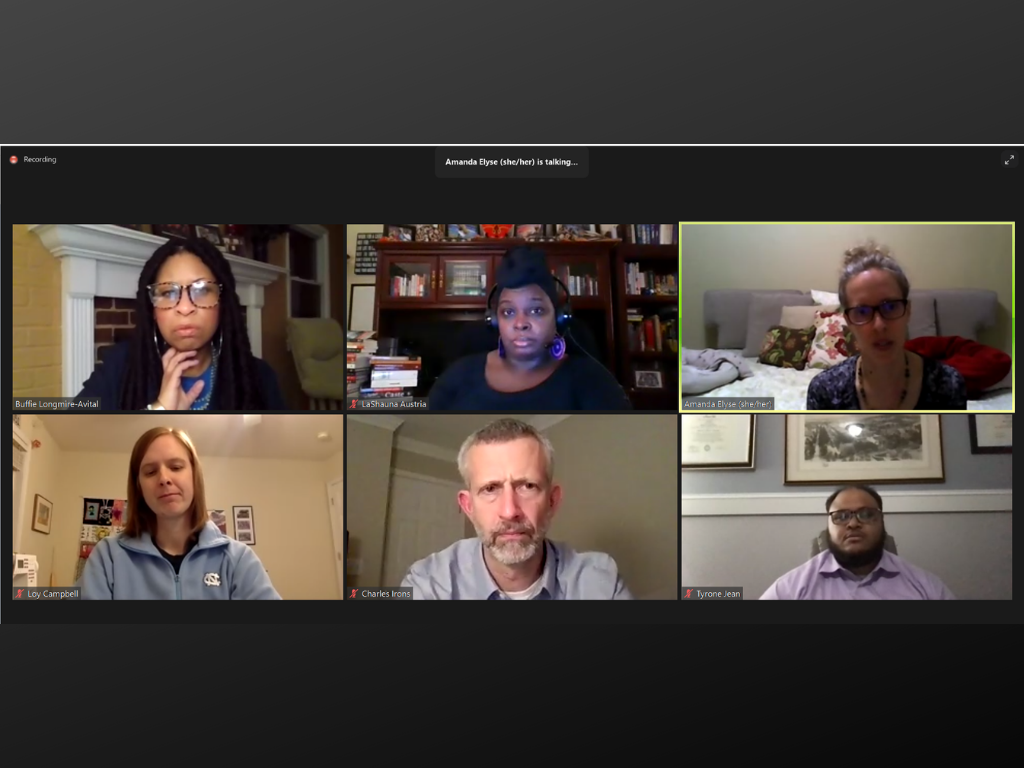Faculty and community members spoke of the legacy of grief and terror spawned by ongoing racial inequity and violence. Elon University must address its past and accelerate change for justice and equality, they said.
Alamance County’s history of racial violence and connections to Elon University were the subject of a panel discussion by faculty and community leaders Wednesday night.
“For Wyatt Outlaw: A Film and Panel Discussion on Lynching in the US” told the stories of the three known lynchings in Alamance County dating back to 1870, local efforts to find and preserve the stories of those victims, and how the community can progress in the face of continued racial oppression. The discussion sprang from a viewing of “An Outrage,” a short film documenting the stories of six lynchings across America and the repercussions on the victims’ descendants and communities. The panel closed with a session for healing and reflection led by faculty and staff.
Elon University has a responsibility to advance conversation, academic study, and progress “as a center for truth-telling,” said Tyrone Jean, assistant dean of students and director of the Center for Race, Ethnicity, and Diversity Education.
“Elon in particular has the opportunity to provide tools for students to advance their awareness of racial inequities, but also for building their sense of self,” Jean said. “We have to prepare students to have knowledge and use analysis so they can do things to make the world a more equitable place.”
Discussion began with unsparing accounts of local lynchings.
“These are stories of terror and the experience of terrorism. These are stories that are ongoing,” said Buffie Longmire-Avital, associate professor of psychology and coordinator of the African and African-American Studies program. “We must not forget the lasting impact anti-Black terror has had on all persons of the Black community, not just on the families of victims and in the communities where they occurred.”
Charles Irons, professor of history and chair of the History and Geography Department, detailed the victims’ stories. Two of the lynchings have connections to Elon, thoroughly detailed in the Committee on History and Memory’s Fall 2020 report, which Irons led.
- Wyatt Outlaw was the first Black person elected as town commissioner and constable of nearby Graham, N.C., and a statewide symbol of biracial democracy. He “was an extraordinary leader and as prominent as any Alamance County produced,” Irons said, with ties to Elon University through his white slave-owner father, Chelsey Faucette, a trustee of Elon forebear The Graham Institute. After fighting off a Ku Klux Klan and Constitutional Union Guard raid in 1869, Outlaw was dragged from his home on Feb. 26, 1870, and hung from a tree near the Graham courthouse. J.A. Long — brother of Elon’s first president, William S. Long — founded Alamance County’s Constitutional Union Guard, a branch of the KKK.
- William Puryear was lynched shortly after Outlaw because he claimed to be able to identify members of the masked party involved in that murder. He was dragged from his home, killed, and his body left in a mill pond where his remains were found three months later. His wife was only able to identify him by his clothing.
- John Jeffress was killed by a mob in 1920 after being accused of a sexual assault. Elon’s fourth president, William Harper, led the posse that arrested Jeffress and worked with a judge to arrange a same-day capital trial. A second mob of armed white men seized Jeffress from custody and murdered him.
“We know that these murders are just the tip of the iceberg,” Irons said. “Racial violence goes deeper and broader (than lynchings and murders). The stories of violence against Blacks are many in Alamance County.”
LaShauna Austria, a member of Alamance County’s Community Remembrance Coalition, described stories of brutality and violence against members of her family and the Black community in Alamance County as recently as a 2019 incident involving Burlington police.
“When we think about the Alamance Remembrance Coalition, we want to speak to these three individuals but also be aware that there’s still a lot of terrorism and violence happening to Black bodies right here in our community,” Austria said.
The coalition is working with the Equal Justice Initiative in Montgomery, Alabama, to memorialize Alamance County’s lynchings in its national museum and monument, said fellow coalition member Loy Campbell.
Elon Law School Assistant Professor Amanda Elyse outlined numerous ways America’s criminal justice system disenfranchises and discriminates against Black citizens. Black Americans’ freedoms of speech and assembly are often curtailed and met with police resistance, their neighborhoods are policed more heavily, and they are more often subject to illegal searches and seizures, Elyse said. Juries are more likely to be biased against Black defendants, leading to higher rates of incarceration.
“You hear people call it a broken system,” Elyse said, “but that’s just the system established by white men in support of white supremacy working as it was intended to. Change is going to have to be radical.”
To spur those changes, Jean said the campus community needs to focus on “transforming higher education policies to redistribute power, wealth, access and address historical wrongs.”
“To our Black students, I would say: Be steadfast, be hopeful, be in community, and be unapologetic in wanting to dismantle racist institutions,” Jean said.
Cherrel Miller Dyce, associate professor of education and director of intercultural education, and John Robinson-Miller IV, CREDE assistant director, led a session afterward for students about the discussion.
The panel was part of CREDE’s Black History Month calendar of events. It was sponsored by numerous centers, departments and programs including: African and African-American Studies, Poverty and Social Justice Studies, the Department of History and Geography, CREDE, the Department of Sociology and Anthropology, American Studies, the Truitt Center, Peace and Conflict Studies, and Criminal Justice Studies.



